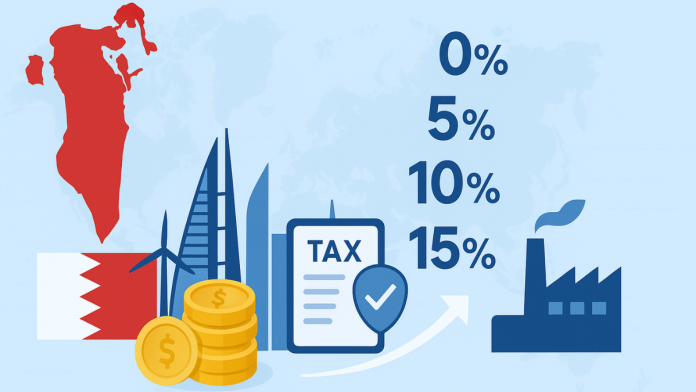Bahrain has long enjoyed a reputation as a low-tax hub in the Middle East. With no personal income tax and minimal corporate taxes for most businesses, it has attracted workers, investors, and companies from around the world. But in recent years, new taxes and reporting rules have begun to change the financial landscape.
A Long History of Low Taxes
For decades, Bahrain has offered one of the most relaxed tax systems in the region. Residents and companies have benefited from the absence of personal income tax, capital gains tax, and inheritance tax. Money earned from salaries, selling property, or shares is untaxed, making Bahrain a popular place to live and work.
Employees contribute to social insurance, which supports government welfare programs. Bahraini nationals pay 7% of their salary, while their employers contribute 12%. For expatriates, employer contributions are lower at 3%. These contributions are capped at a salary of 4,000 Bahraini Dinars (about 10,500 US dollars) per month.
For businesses, the tax system is equally attractive. Most companies do not pay corporate tax, except for oil and gas firms, which are taxed at a rate of 46% on profits. There are also no withholding taxes on dividends, interest, or royalties paid to individuals or foreign entities. Additionally, Bahrain generally does not apply controlled foreign corporation (CFC) rules or transfer pricing regulations, making it easier for businesses to operate.
💸 $1.3M check that shouldn’t exist — Jesse El-Ghoul faces decades in prison for tax refund fraud
Recent Tax Changes and Reporting Rules
Despite its traditionally low-tax environment, Bahrain has introduced several taxes and regulations in the past few years. In 2017, excise tax was introduced on products that harm health. Tobacco and energy drinks carry a 100% tax, while carbonated drinks are taxed at 50%. The government may add other products to this list in the future.
In 2019, the country implemented a Value Added Tax (VAT) system to align with regional standards. VAT started at 5% and increased to 10% in 2022. Most goods and services are subject to VAT, though some are exempt or taxed at 0%. Businesses with annual sales exceeding 37,500 Bahraini Dinars must register for VAT, while those with sales over 18,750 Bahraini Dinars may register voluntarily. Non-resident companies are required to register from their first taxable transaction within the kingdom.
Large multinational companies must comply with Country-by-Country Reporting (CbCR) rules introduced in 2021. These rules require certain businesses to provide detailed reports on their global operations, income, and taxes paid, supporting transparency and international tax cooperation.
Starting in 2025, the country will implement the Domestic Minimum Top-Up Tax (DMTT) at 15%. This tax applies to Bahrain-based entities that are part of large multinational groups. The DMTT aligns with the OECD’s Pillar Two framework, designed to ensure that big international companies pay a minimum level of tax regardless of where they operate. While this affects mainly large multinational groups, it signals the country’s commitment to international tax standards.
Remittance Tax Begins July 4: What NRIs and Indian Students Must Know
International Agreements and Free Zones
Bahrain has signed 45 Double Taxation Agreements (DTAs) with countries around the world, including major economies in Europe and Asia. These agreements prevent income from being taxed twice — once in Bahrain and again in the other country — which helps encourage international trade and investment.
In 2022, the kingdom ratified the OECD’s Multilateral Instrument (MLI). This treaty enables it to quickly update tax agreements and implement OECD-recommended anti-avoidance rules without renegotiating each treaty individually.
Free zones in Bahrain offer significant tax advantages for businesses. Companies operating in these zones can enjoy exemptions from various taxes, making them attractive for sectors like trade, logistics, and manufacturing. However, businesses must comply with local regulations to maintain their exempt status, including proper reporting and ensuring their activities align with the free zone’s purpose.
Another key feature of Bahrain’s tax environment is its open-market policy. There are no restrictions on moving money in or out of the country. This unrestricted capital flow makes Bahrain a flexible and investor-friendly destination.


